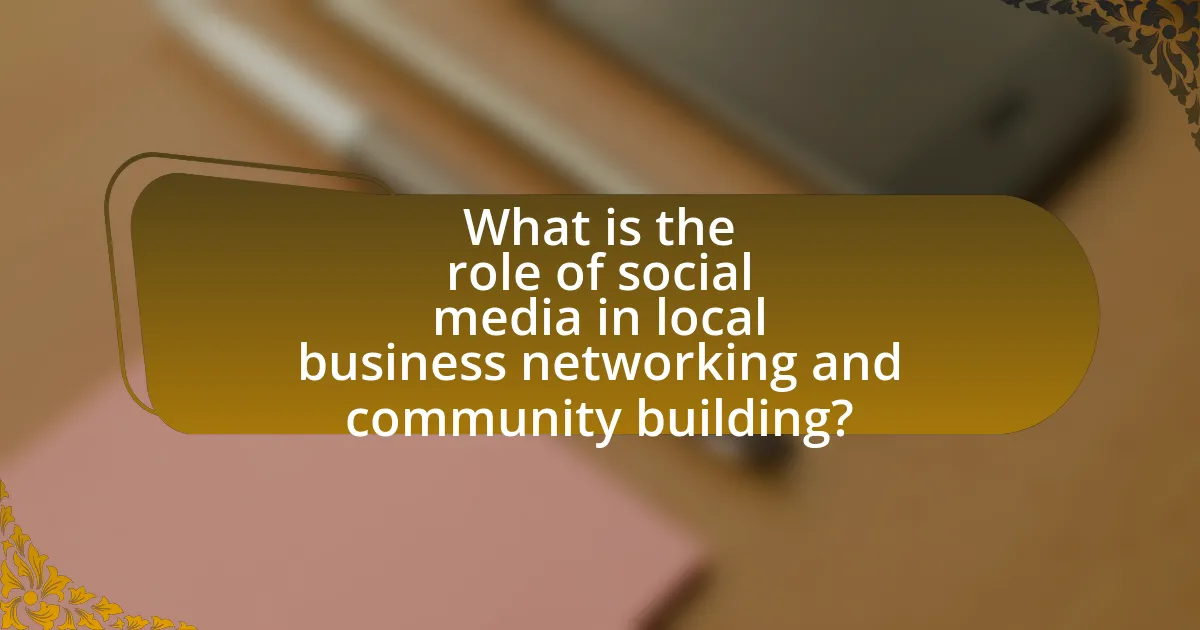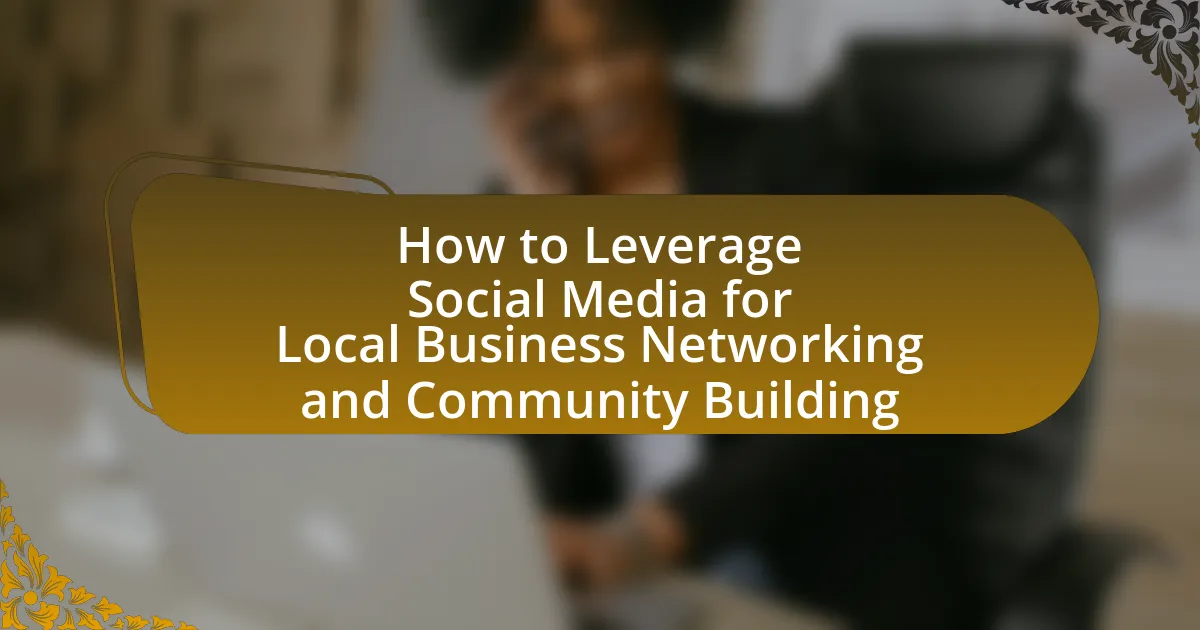The article focuses on leveraging social media for local business networking and community building. It highlights the essential role social media plays in connecting local businesses with customers and community members, enhancing visibility, and fostering engagement. Key platforms such as Facebook, Instagram, and Google My Business are discussed for their effectiveness in reaching local audiences. The article also outlines strategies for creating engaging content, collaborating with local influencers, and measuring social media success through performance metrics. Additionally, it emphasizes the importance of community support for business growth and offers best practices for maintaining a consistent online presence.

What is the role of social media in local business networking and community building?
Social media plays a crucial role in local business networking and community building by facilitating connections among local businesses, customers, and community members. It enables businesses to engage directly with their audience, share updates, and promote events, fostering a sense of community. According to a survey by the Pew Research Center, 69% of adults in the U.S. use social media, which provides a vast platform for local businesses to reach potential customers and collaborate with other businesses. Additionally, social media allows for the creation of local groups and forums where community members can discuss local issues, share recommendations, and support one another, thereby strengthening community ties.
How can social media enhance local business visibility?
Social media enhances local business visibility by providing platforms for targeted advertising and community engagement. Local businesses can utilize social media tools to reach specific demographics within their geographic area, increasing the likelihood of attracting nearby customers. For instance, Facebook’s advertising system allows businesses to target users based on location, interests, and behaviors, which can lead to higher engagement rates. According to a 2021 survey by the Pew Research Center, 69% of adults in the U.S. use Facebook, making it a powerful tool for local businesses to connect with potential customers in their vicinity. Additionally, social media facilitates direct interaction with the community through posts, comments, and messages, fostering relationships that can enhance brand loyalty and visibility.
What platforms are most effective for local businesses?
The most effective platforms for local businesses are Facebook, Instagram, and Google My Business. Facebook allows businesses to engage with local communities through targeted ads and groups, with over 2.9 billion monthly active users, making it a powerful tool for reaching local customers. Instagram, with its visual focus, is particularly effective for businesses in industries like food, fashion, and services, as it boasts over 1 billion monthly users and high engagement rates. Google My Business enhances local visibility by allowing businesses to manage their online presence on Google Search and Maps, which is crucial since 46% of all Google searches are seeking local information.
How does social media influence customer engagement?
Social media significantly influences customer engagement by providing platforms for direct interaction between businesses and consumers. This interaction fosters a sense of community and belonging, which enhances customer loyalty. According to a study by Sprout Social, 64% of consumers want brands to connect with them on social media, indicating that engagement through these channels is crucial for building relationships. Furthermore, social media allows businesses to gather real-time feedback, enabling them to respond quickly to customer needs and preferences, thereby increasing satisfaction and retention rates.
Why is community building important for local businesses?
Community building is crucial for local businesses because it fosters customer loyalty and enhances brand visibility. When local businesses engage with their communities, they create strong relationships that encourage repeat patronage and word-of-mouth referrals. According to a study by the American Independent Business Alliance, local businesses that actively participate in community events and initiatives see a 20% increase in customer loyalty. This engagement not only strengthens the business’s reputation but also contributes to a vibrant local economy, as customers are more likely to support businesses that are invested in their community.
What are the benefits of a strong local community for businesses?
A strong local community provides businesses with increased customer loyalty and support. When businesses engage with their local community, they foster relationships that lead to repeat customers and word-of-mouth referrals. According to a study by the Local Business Association, 70% of consumers are more likely to support a business that is actively involved in their community. Additionally, local businesses benefit from collaborative opportunities, such as partnerships with other local entities, which can enhance visibility and drive sales. This interconnectedness creates a robust network that supports economic growth and sustainability within the community.
How does community support impact business growth?
Community support significantly enhances business growth by fostering customer loyalty and increasing brand visibility. When local businesses engage with their communities, they build trust and rapport, which leads to repeat customers and positive word-of-mouth referrals. According to a study by the Local Initiatives Support Corporation, businesses that actively participate in community events and support local causes see a 20% increase in customer retention rates. This engagement not only strengthens relationships but also positions the business as a vital part of the community, further driving sales and attracting new customers.

What strategies can local businesses use to leverage social media?
Local businesses can leverage social media by creating engaging content, utilizing targeted advertising, and fostering community interaction. Engaging content, such as local events, promotions, and behind-the-scenes looks, attracts followers and encourages sharing, which increases visibility. Targeted advertising allows businesses to reach specific demographics, enhancing the effectiveness of marketing efforts; for instance, Facebook Ads can be tailored to local audiences based on location and interests. Additionally, fostering community interaction through responding to comments, hosting live Q&A sessions, and collaborating with local influencers builds relationships and trust, which are crucial for customer loyalty. These strategies are supported by studies showing that businesses with active social media engagement see a 20-40% increase in customer retention rates.
How can businesses create engaging content for their local audience?
Businesses can create engaging content for their local audience by focusing on local relevance and community involvement. This can be achieved through sharing stories about local events, highlighting local partnerships, and showcasing customer testimonials from the community. For instance, a study by the Local Search Association found that 76% of consumers prefer to learn about local businesses through personalized content that reflects their community. By utilizing social media platforms to promote local events or initiatives, businesses can foster a sense of belonging and encourage community interaction, thereby enhancing engagement.
What types of content resonate most with local customers?
Local customers resonate most with content that is relevant to their community, such as local news, events, promotions, and user-generated content. This type of content fosters a sense of belonging and connection, as it directly addresses the interests and needs of the local audience. For instance, a study by the Local Search Association found that 76% of consumers prefer to see content that highlights local events and businesses, indicating a strong preference for community-focused information. Additionally, showcasing customer testimonials and stories can enhance trust and engagement, as local customers often value recommendations from their peers.
How can storytelling enhance local business marketing?
Storytelling can enhance local business marketing by creating emotional connections with customers, which fosters loyalty and engagement. When local businesses share authentic stories about their origins, values, or customer experiences, they resonate more deeply with their community. Research indicates that storytelling can increase brand recall by up to 22 times compared to facts alone, as narratives are more memorable and relatable. This emotional engagement not only attracts new customers but also encourages existing ones to share their experiences, amplifying word-of-mouth marketing within the community.
What role do local influencers play in social media networking?
Local influencers play a crucial role in social media networking by enhancing brand visibility and fostering community engagement. They leverage their established trust and rapport within local communities to promote businesses, products, and services effectively. Research indicates that 49% of consumers depend on influencer recommendations for their purchasing decisions, highlighting the significant impact local influencers have on consumer behavior. By sharing authentic content and personal experiences, local influencers can drive traffic to local businesses and create a sense of community, ultimately contributing to stronger local networks and increased sales.
How can businesses identify and collaborate with local influencers?
Businesses can identify and collaborate with local influencers by utilizing social media platforms to search for individuals who have a significant following within their community. They can use tools like social media analytics, hashtags relevant to their industry, and location tags to find influencers who align with their brand values and target audience. For example, a study by the Digital Marketing Institute found that 49% of consumers depend on influencer recommendations, highlighting the effectiveness of influencer partnerships. Once identified, businesses can reach out through direct messaging or email to propose collaboration opportunities, such as sponsored posts or events, ensuring mutual benefits are clearly outlined to foster a successful partnership.
What are the potential benefits of influencer partnerships?
Influencer partnerships can significantly enhance brand visibility and credibility. By collaborating with influencers who have established trust with their audience, businesses can tap into a wider and more engaged customer base. Research indicates that 49% of consumers depend on influencer recommendations when making purchasing decisions, highlighting the effectiveness of these partnerships in driving sales and brand loyalty. Additionally, influencer collaborations often lead to increased social media engagement, as posts featuring influencers generate higher interaction rates compared to traditional advertising methods.

How can local businesses measure the success of their social media efforts?
Local businesses can measure the success of their social media efforts by analyzing key performance indicators (KPIs) such as engagement rates, follower growth, and conversion rates. Engagement rates, which include likes, shares, and comments, indicate how well content resonates with the audience; for instance, a 2% engagement rate is considered average across platforms. Follower growth reflects the expanding reach of the business, while conversion rates, which track actions taken by users (like making a purchase or signing up for a newsletter), provide insight into the effectiveness of social media campaigns. According to a report by Hootsuite, businesses that actively track these metrics can improve their social media strategies by up to 30%, demonstrating the importance of measurement in achieving social media success.
What metrics should businesses track for social media performance?
Businesses should track engagement rate, reach, impressions, follower growth, and conversion rate for social media performance. Engagement rate measures interactions (likes, comments, shares) relative to total followers, indicating content effectiveness. Reach quantifies the number of unique users who see posts, while impressions count total views, helping assess visibility. Follower growth tracks audience expansion over time, reflecting brand interest. Conversion rate measures the percentage of users taking desired actions (e.g., website visits, purchases) from social media, directly linking social efforts to business outcomes. These metrics provide a comprehensive view of social media effectiveness and inform strategic adjustments.
How can engagement rates indicate community interest?
Engagement rates serve as a direct metric for assessing community interest by quantifying interactions such as likes, shares, comments, and overall participation with content. High engagement rates suggest that community members find the content relevant and are actively participating in discussions, indicating a strong interest in the topics presented. For instance, a study by Sprout Social found that posts with higher engagement rates typically correlate with increased brand loyalty and community involvement, demonstrating that when audiences engage, they are more likely to feel connected to the community and its initiatives.
What tools can assist in measuring social media success?
Tools that can assist in measuring social media success include Google Analytics, Hootsuite, Sprout Social, and Buffer. Google Analytics tracks website traffic and user behavior originating from social media platforms, providing insights into conversion rates and audience demographics. Hootsuite offers comprehensive analytics for social media engagement, allowing users to monitor performance across multiple platforms in one dashboard. Sprout Social provides detailed reports on audience engagement, post performance, and social listening metrics, enabling businesses to refine their strategies. Buffer focuses on post-scheduling and performance analytics, helping users understand which content resonates best with their audience. These tools collectively provide valuable data that can inform and enhance social media strategies for local business networking and community building.
How can businesses adapt their strategies based on social media insights?
Businesses can adapt their strategies based on social media insights by analyzing engagement metrics, audience demographics, and trending topics to refine their marketing approaches. For instance, if a business observes that a particular type of content, such as video tutorials, garners higher engagement rates, it can shift its content strategy to prioritize video production. Additionally, insights into audience demographics can inform targeted advertising campaigns, ensuring that marketing efforts reach the most relevant consumers. Research from Sprout Social indicates that 70% of marketers use social media insights to inform their strategies, demonstrating the effectiveness of data-driven decision-making in enhancing customer engagement and driving sales.
What are common pitfalls to avoid in social media marketing?
Common pitfalls to avoid in social media marketing include inconsistent branding, neglecting audience engagement, and failing to analyze performance metrics. Inconsistent branding can confuse potential customers and dilute brand identity, as studies show that cohesive branding can increase revenue by up to 23%. Neglecting audience engagement leads to missed opportunities for building relationships and trust, which are crucial for local businesses. Additionally, failing to analyze performance metrics prevents marketers from understanding what strategies work, as data-driven decisions can improve campaign effectiveness by 30% or more.
How can feedback from social media shape future campaigns?
Feedback from social media can significantly shape future campaigns by providing real-time insights into customer preferences and sentiments. This feedback allows businesses to adjust their messaging, targeting, and content strategies based on what resonates with their audience. For instance, a study by Sprout Social found that 70% of consumers are more likely to engage with brands that respond to their social media feedback, indicating that active engagement can enhance brand loyalty and inform campaign adjustments. By analyzing comments, shares, and likes, businesses can identify trends and areas for improvement, ensuring that future campaigns are more aligned with customer expectations and market demands.
What are some best practices for effective local business networking on social media?
Effective local business networking on social media involves actively engaging with the community, sharing valuable content, and building relationships. Businesses should regularly post updates, promotions, and local events to attract attention and foster connections. Engaging with followers through comments and messages enhances visibility and trust. Collaborating with other local businesses for joint promotions or events can expand reach and create a supportive network. Utilizing local hashtags and participating in community groups increases discoverability among local audiences. According to a 2021 survey by the Pew Research Center, 69% of adults in the U.S. use social media, highlighting its importance as a platform for local engagement.
How can businesses maintain a consistent online presence?
Businesses can maintain a consistent online presence by regularly posting relevant content across their social media platforms. This involves creating a content calendar to schedule posts, ensuring a mix of promotional, educational, and engaging material that resonates with their target audience. According to a study by HubSpot, companies that post consistently on social media experience 67% more leads than those that do not. Additionally, utilizing analytics tools to track engagement and adjust strategies accordingly helps businesses stay relevant and connected with their audience.
What tips can enhance community engagement through social media?
To enhance community engagement through social media, businesses should prioritize authentic interactions and consistent content sharing. Authentic interactions foster trust and connection, as studies show that 70% of consumers feel more connected to brands that engage with them on social media. Consistent content sharing keeps the community informed and involved, with research indicating that brands posting regularly see a 50% increase in engagement rates. Additionally, utilizing user-generated content encourages community participation, as 79% of consumers say user-generated content highly impacts their purchasing decisions. By implementing these strategies, businesses can effectively strengthen their community engagement on social media platforms.
